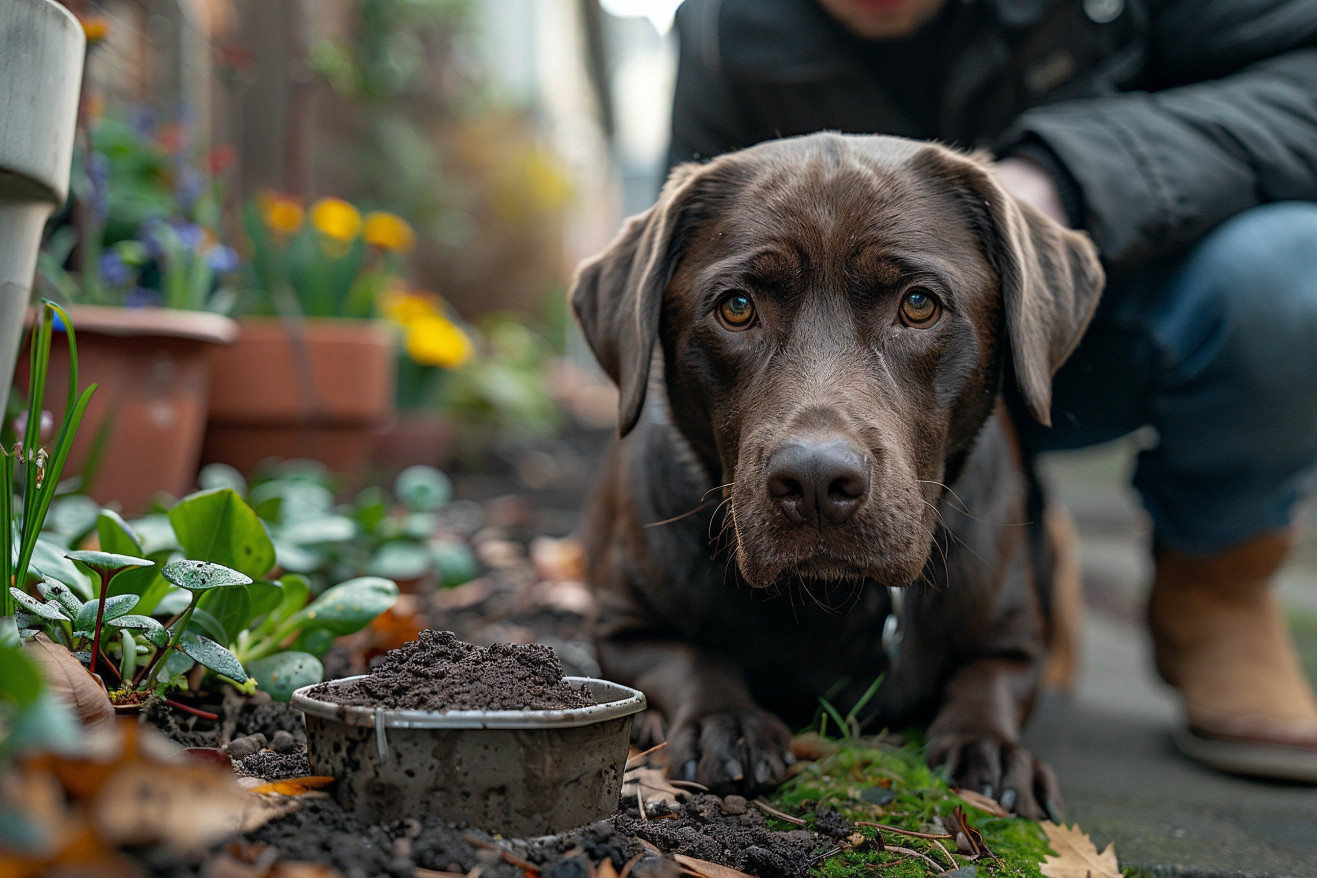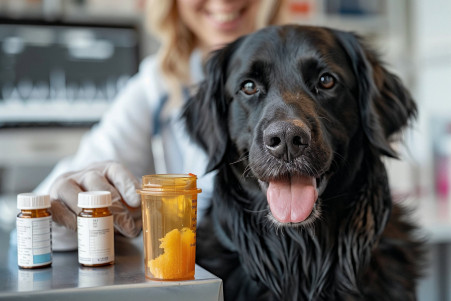Why Is My Dog’s Poop Black? Understanding the Health Implications
2 March 2024 • Updated 1 March 2024

If you’ve ever come across black dog poop, you know how shocking it can be. But what does this sudden change really mean? Black dog poop, also known as melena, is typically a sign that the dog has passed blood from the upper gastrointestinal tract, which can be a sign of serious health problems like internal bleeding or ulcers.
It is important to get your dog to the vet right away if you notice this change in their poop.
In this article, we will explore the many veterinary studies and medical insights that have been written about this worrisome symptom to find out what could be causing your dog’s black poop. From the impact of diet to more serious health problems, the research covers everything from diagnosis to treatment to prevention. Our goal is to help you learn more about this condition and what it could mean for your dog’s health.
Why is my dog's poop black?
Decoding the Diet: Changes in Diet and Their Effect on Dog Poop Color
A dog’s diet can have a direct impact on the color of their poop, and there are certain foods or additives that are known to have an impact on this particular aspect of their well-being.
For example, as Nom Nom points out, when dogs are switched to fresh food diets, it can lead to a change in the color of their poop. This is because the ingredients in fresh food diets can have compounds that affect the color of the poop, and while this can be surprising, it’s not usually a cause for concern.
In addition, a study by P.J. Canfield that was published on PubMed shows that different diets, including those that contain cooked and raw ground meat, have a consistent impact on the appearance of dogs’ poop.
When dog owners change their dogs’ diets or introduce new meats into their diets, it’s not uncommon for the characteristics of their poop to change.
In fact, a change to darker poop can simply be a reflection of the new diet and is often a normal part of the adjustment period.
That said, if a dog’s poop remains black and tarry over time, as described by PetHelpful, it’s time to start looking into the issue further. While dietary changes can cause harmless differences in the color of a dog’s poop, black and tarry poop that doesn’t go away can be a sign of a more serious health issue.
It’s important to monitor your dog’s diet and any changes in the color of their poop closely. If your dog’s diet has changed recently and their poop goes back to its normal color, it’s likely that the change in color was due to the change in diet. That said, if the black color doesn’t go away or if it’s accompanied by other symptoms, it’s a good idea to contact your vet for advice.
What Are the Scary Reasons for Black Dog Poop?
If your dog has black, tarry stool, it’s time to rule out dietary changes. ElleVet Sciences says that this type of stool could be a sign of gastrointestinal bleeding or ulcers, both of which are serious conditions.
Gastrointestinal bleeding is often caused by ulcers, tumors, or infections and can happen anywhere from the mouth to the small intestines. The iron in the blood that’s been digested is what causes the stool to turn black, a condition called melena.
Signs of gastrointestinal bleeding include diarrhea, vomiting (which may contain blood), pale mucous membranes, bruising, and weight loss, according to WagWalking. If your dog has any of these symptoms along with black stool, it’s a sign of a serious medical problem and you should take them to the vet immediately.
As part of the diagnosis, the vet will perform a thorough physical exam and may also recommend bloodwork, fecal testing, and imaging studies like X-rays or ultrasound, says Great Pet Care. These tests are designed to find out what’s causing the black stool so that the vet can recommend the best course of treatment.
It’s important to note how serious these symptoms are. If your dog is experiencing these scary symptoms, it’s important to get them to the vet right away. Not only could this be life-saving, but it could also help you understand how to manage your dog’s health going forward.
How Melena in Dogs Is Treated
Veterinarians treat the conditions that cause melena in dogs differently depending on the cause. In the case of gastrointestinal (GI) hemorrhage, which is a common cause of melena, as noted in a study in PMC, it is important to treat the GI hemorrhage immediately. This means that the vet will first work to stabilize the dog’s cardiovascular system and then treat the underlying issues, which can include ulcers or coagulopathies.
In addition to treatment, dietary changes are often made, and the dog is fed a bland diet that is easy to digest and won’t irritate the GI system.
Medications are also used to help treat melena, and these can include drugs that reduce the production of stomach acid and medications that coat the ulcerated areas and help them heal.
In more serious cases, such as those described in a case report in BMC Veterinary Research by Roxana Merca, surgery may be required to remove the underlying cause, such as the heterotopic gastric mucosa in the jejunum. After surgery, the vet will work to ensure that the dog heals properly and will require follow-up appointments to make sure that the dog is recovering as expected.
While recovery can be long, with proper treatment, many dogs can return to their normal lives. This will require regular check-ins with the vet and close monitoring by the dog’s owner.
The owner will also need to monitor their dog’s stool to make sure that it is returning to a normal color, which can be an early sign of recovery or a sign of a problem. This will also require the owner to consider other causes of stool discoloration, including internal parasites.
Parasites and Their Impact on Stool Color
Parasitic infections are common in dogs and can lead to a variety of gastrointestinal issues, including changes in stool color. Hookworms and roundworms are just two examples of parasites that can cause bleeding and inflammation in the digestive system, which can lead to black, tarry stool, a condition known as melena. In fact, VCA Animal Hospitals notes that hookworms are especially well-known for causing severe anemia and melena due to their blood-sucking behavior.
The Merck Veterinary Manual notes that hookworms (Ancylostoma caninum), roundworms (Toxocara canis), whipworms (Trichuris vulpis), and tapeworms (Dipylidium caninum) are common parasites that can disrupt the digestive system and cause changes in stool color. In most cases, these parasites are diagnosed through a fecal float test, which is a microscopic examination of a stool sample that looks for eggs or parasites, according to WagWalking.
Treatment for parasitic infections is often very effective and depends on the specific parasite involved. In general, it may include one or more anti-parasitic medications.
Preventing parasitic infections and the resulting changes in stool color is important and can be achieved through regular fecal exams and the use of heartworm prevention that also protects against intestinal parasites. In addition, maintaining good sanitation and avoiding areas where parasites are likely to be found can help dog owners keep their pets safe from parasitic infections.
Environmental Hazards: Household Toxins That Cause Black Stool in Dogs
While our homes are a safe space for our pets, they can also contain a number of substances that are extremely dangerous if ingested. According to the ASPCA, some of the most common household toxins that can cause melena in dogs are human over-the-counter drugs like ibuprofen and naproxen, as well as prescription medications like antidepressants and heart drugs.
Even some common foods like chocolate, xylitol, and grapes can be poisonous to dogs and cause gastrointestinal bleeding that leads to black, tarry stools.
When a dog ingests these substances, it can wreak havoc on their gastrointestinal system. The FDA’s Center for Veterinary Medicine notes that signs of poisoning can include vomiting, diarrhea, and black stool that indicates internal bleeding. It’s important to act quickly— if you think your dog has ingested a poisonous substance, call your vet right away, which is the recommendation of the ASPCA Animal Poison Control Center.
Knowing what to look for can help you prevent accidental poisoning. Make sure to keep medications and foods that are toxic to dogs out of their reach and be aware of potential hazards in their environment. Understanding the symptoms and the importance of seeking medical attention can help you keep your pet safe from these threats.
The Emotional Palette: Stress and Stool Color in Dogs
The relationship between a dog’s stress and their digestive system is a complex one that shows how psychological factors can lead to changes in stool color.
Studies cited by Ingredia USA Inc. show that stress can lead to an increase in nerve activity in the intestines, which in turn leads to a decrease in blood flow to the gastrointestinal tract, causing vomiting and diarrhea.
This shows that stress can play a role in digestive issues, and therefore stress can be a reason for black stool in dogs, as black stool can be a sign of internal bleeding or upper gastrointestinal issues.
This is backed up by a study in PMC, which explains that the body’s stress response, especially the actions of the hypothalamic-pituitary-adrenal axis, can lead to a catabolic state that affects the gastrointestinal tract. Pet parents can help to combat these physiological changes and potentially stop stress-induced changes in stool color by keeping a calm home, making sure their dog gets regular exercise, and sticking to a schedule.
It’s so important to understand the role that a dog’s emotional state plays in their overall health. By taking care of a dog’s emotional and physical needs, pet parents can make sure their dogs live longer, healthier lives with fewer digestive issues. Taking a holistic approach to health is important for a dog’s overall care and wellness.
Final Thoughts on Black Dog Poop and Your Dog’s Health
As we have seen, there are many reasons why dogs might have black poop, or melena. Dietary changes can lead to darker poop, and Nom Nom’s information about fresh food diets supports this. A study on PubMed demonstrates how different kinds of meat can change the color of poop, and it’s important to remember that not all changes are bad.
However, if black poop continues, it could be a sign of more serious health problems like gastrointestinal bleeding or ulcers, and it’s important to get medical attention as soon as possible, as ElleVet Sciences and WagWalking point out.
The treatments for these issues can be very different and may include dietary changes, pharmaceutical treatments, as a study on PMC suggests, and even surgery, as Roxana Merca explains in a case report in BMC Veterinary Research.
Parasites and environmental toxins, which are covered by VCA Animal Hospitals and ASPCA, are other potential causes of melena. Stress can also change the color of a dog’s poop, as Ingredia USA Inc. and a study on PMC explain.
In the end, it’s important to make sure that you’re keeping an eye on the quality of your dog’s poop. By noticing changes and acting accordingly, we can make sure that our furry friends stay healthy and happy for years to come.


